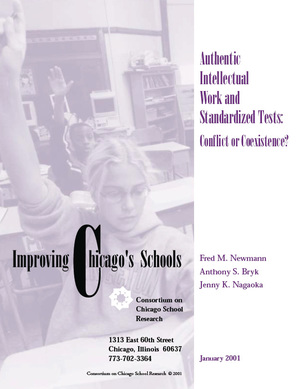What happens to students' scores on standardized tests of basic skills when urban teachers in disadvantaged schools assign work that demands complex thinking and elaborated communication about issues important in students' lives?
This report is one of a series of special topic reports developed by the Chicago Annenberg Research Project. It presents the results of a study of Chicago teachers' assignments in mathematics and writing in grades three, six, and eight. The study showed that students who received assignments requiring more challenging intellectual work also achieved greater than average gains on the Iowa Tests of Basic Skills in reading and math, and demonstrated higher performance in reading, math, and writing on the Illinois Goals Assessment Program.
Contrary to some expectations, the authors find that high quality assignments were found in some very disadvantaged Chicago classrooms and that all students in these classes benefited from exposure to such instruction. The results suggest that if teachers, administrators, policymakers, and the public-at-large place more emphasis on authentic intellectual work in classrooms, yearly gains on standardized tests in Chicago could surpass national norms.
EXECUTIVE SUMMARY
Student success in contemporary society requires not only basic knowledge and skills but also the capacity to engage in more complex intellectual activity. Discussion of best instructional practices or forms of assessment, however, frequently poses a dichotomy between teaching approaches that enhance basic skills versus those that aim at more ambitious intellectual work, implying a trade-off between these two educational goals. The evidence presented here suggests that this debate rests on a false dichotomy.
Prior studies have documented that when teachers organize instruction around assignments that demand higher order thinking, in-depth understanding, elaborated communication and that make a connection to students’ lives beyond school, students produce more intellectually complex work. This study of Chicago teachers’ assignments in mathematics and writing in grades 3, 6, and 8, shows that students who received assignments requiring more challenging intellectual work also achieved greater than average gains on the Iowa Tests of Basic Skills in reading and mathematics, and demonstrated higher performance in reading, mathematics,and writing on Illinois Goals Assessment Program. Contrary to some expectations, we found high quality assignments in some very disadvantaged Chicago classrooms and that all students in these classes benefited from exposure to such instruction.
We conclude, therefore, assignments calling for more authentic intellectual work actually improve student scores on conventional tests. The results suggest that, if teachers, administrators, policymakers, and the public at-large place more emphasis on authentic intellectual work in classrooms, yearly gains on standardized tests in Chicago could surpass national norms.


